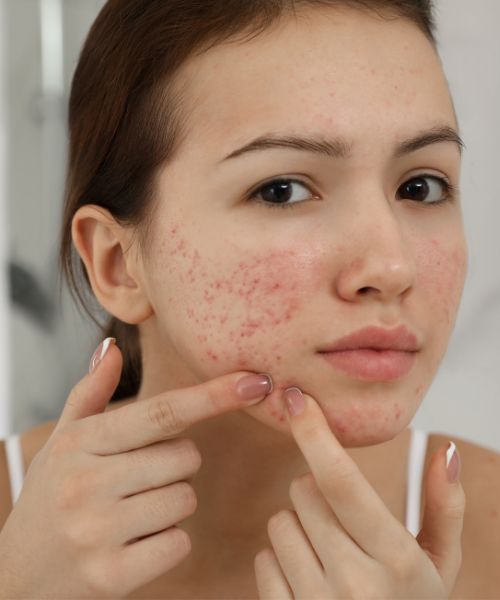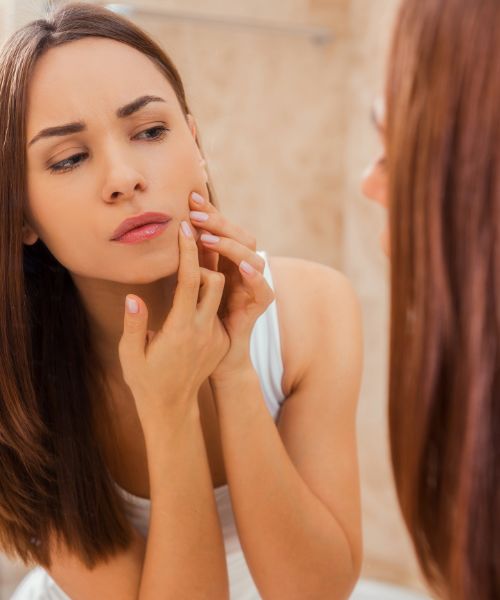According to the World Health Organization, more than 100 million women around the world use the oral contraceptive – better known as the birth control pill.
Of the 100 million women on the pill, roughly 60% take it for non-contraceptive reasons like painful periods, endometriosis, PCOS, and acne.
While the birth control pill is widely prescribed as a quick-fix solution to a variety of women’s health conditions, taking it can also result in a host of health and skin problems, including the worsening of the very thing it was prescribed to fix – acne.
So, if you’re on the pill and experiencing increased breakouts, what can you do to treat it?
In this article, we’ll discuss the underlying causes of acne triggered by birth control and how to treat it.

How Does Birth Control Work?
Most women who are on the pill take what’s called the combined pill.
This pill contains both progesterone and estrogen, a synthetic version of the two hormones naturally present in our bodies and responsible for regulating the menstrual cycle.
The pill works by switching off these hormones, which stop your ovaries from releasing eggs, preventing ovulation from occurring, and thus stopping sperm from reaching the uterus. This, in turn, prevents pregnancy.
Why is Birth Control Prescribed for Acne?
Birth control is prescribed for what’s considered to be hormonal acne in an attempt to regulate hormones and ultimately lead to clearer skin.
By inhibiting ovarian and adrenal androgen synthesis and increasing levels of sex hormone-binding globulin, birth control also suppresses testosterone, a male hormone found in the female body in small quantities, which can help reduce oil production and clear up breakouts short term.
However, while this approach works for some, it often backfires and leads to new skin issues, including the worsening of acne breakouts.
Can Birth Control Cause Acne?

Yes, birth control is, in many cases, responsible for the worsening of acne, especially after stopping it.
When taking the pill, your body is exposed to hormones that don’t work properly.
However, when you stop taking the pill, your body is forced to return to its natural levels of hormones. This sudden shift can cause high estrogen and low progesterone levels.
When estrogen levels are too high, and progesterone levels are too low, it results in estrogen dominance.
This condition occurs due to the inability of the gut flora to dispose of excess estrogens from food and plastics, oral contraceptives, hormone replacement therapy, and other endocrine disruptors, which leaves women with too much estrogen relative to progesterone.
And this can be a huge issue because it’s proven that most struggles with hormonal imbalances affecting the female brain and body may be associated with estrogen dominance.
This includes everything from fibroids and fibrocystic breasts to heavy and painful periods, hormonal headaches, premenstrual syndrome, irregular cycles, and acne.
The reason for this is that excess estrogen can contribute to pro-inflammatory metabolic changes and block the body’s natural elimination pathways, disabling its ability to eliminate excess bacteria.
The bacteria can then be reabsorbed into the bloodstream and end up in the sebaceous glands, where they can trigger an overproduction of what we know as “bad sebum,” a substance that contains an unbalanced ratio of lipids.
This altered sebum turns comedogenic, clogs our pores, and triggers the formation of pimples.
Progesterone, on the other hand, is a calming hormone; if you have too little of it, it can result in anxiety, increased stress levels, sleep problems, mood swings, and even acne.
Therefore, you can alleviate some of the symptoms associated with estrogen dominance by normalizing these hormone levels.
However, while many of us are told that the birth control pill balances and normalizes these hormones, it switches them off instead.
Think about it! When you’re on birth control, you don’t ovulate, which means birth control has switched off ovulation and the hormones that are causing it.
This can lead to a massive imbalance that can cause serious implications for your overall health and well-being, including the health of your skin.
Additionally, besides messing with your hormones, birth control also depletes the body of essential vitamins, including zinc, magnesium, selenium, and B vitamins, which are all needed for healthy skin.
Therefore, while birth control is marked safe and effective and can, in some cases, help get rid of acne short term, using it for this purpose alone can cause some serious long-term issues and is definitely not worth it.
Can Birth Control Treat Acne?
Birth control can help mask the symptoms of acne, but it certainly won’t treat the condition.
Acne often comes back once you stop taking the pill, as your body will experience a sharp hormonal change yet again.
Therefore, while birth control can be helpful for some in the short term, it’s not a sustainable solution, and it’s best to opt for other, more useful ways of managing acne.
How to Treat Acne Caused by Birth Control?

Treating acne caused by birth control can be a long process that requires patience, dedication, and many changes.
However, since this journey can be somewhat overwhelming, here are some great places to start healing your skin and restoring balance in your body:
Quit Birth Control
Birth control can definitely be taxing on your physical and mental health, and quitting might be the best option for some.
However, it’s important to talk to your doctor before doing so.
If you’ve been using birth control for a long time, chances are that quitting will have some challenges that need to be considered.
In some cases, quitting birth control after taking it for a long time can lead to weight gain, mood swings, fatigue, anxiety, and even depression.
Therefore, having a provider that asks about your lifestyle and diet habits, and is willing to help you transition off the pill instead of simply disregarding your symptoms, can be extremely helpful.
Support during this change is essential, so don’t settle for a doctor who won’t take the time to give you comprehensive advice.
Over-The-Counter Skincare
Acne can be improved with the right skincare routine.
Cleansing your skin twice a day with gentle, non-drying cleansers, incorporating active ingredients like salicylic acid and retinoids, and using a broad-spectrum sunscreen every day will help you get good results with consistency and patience.
Professional Skincare Products
Professional skincare products sold through estheticians are another great option for treating acne.
These products work so well because they are formulated to support each other. Therefore, if your esthetician provides in-office treatments like chemical peels from one line, the homecare version of the same line can help you maintain those results.
Regular Treatments
Besides having an excellent skincare routine, regular treatments like chemical peels or light-based treatments like LED therapy can help keep acne at bay and give you clearer, healthier skin.
These treatments help promote cell turnover and reduce inflammation, which are two critical components in treating acne.
Diet Changes
Diet changes are crucial for eliminating acne because food is something that has a direct effect on our hormones, which then have a direct impact on our skin.
For example, certain foods high in sugar, dairy, and processed ingredients can trigger inflammatory reactions in the body and lead to a disruption in the balance of hormones, which will then lead to breakouts over time.
Therefore, it’s important to keep an eye on what you are eating and consider eliminating certain trigger foods or adding nutrient-dense, anti-inflammatory ingredients, and supplements.
Lifestyle Changes
Our lifestyle habits are another thing that dramatically affects our hormones and, thus, our skin.
Stress, lack of sleep, and lack of exercise can all lead to various issues, from imbalanced hormones to stagnant lymph, which can disrupt the natural functioning of our skin and lead to unwanted breakouts.
Therefore, leading a healthier lifestyle is another crucial detail to consider if you’re looking for ways to reduce acne.
At the end of the day, managing acne caused by birth control requires patience and consistency.
The most important thing is to find a regimen that works for you and stick with it, even if the changes take time to show.
Your skin certainly won’t clear up after a couple of exercises or a week of eating healthier.
But if you’re consistent, you’ll eventually experience great results.

My name is Simone and I am a certified skin specialist. I created this website to teach my readers how to take great care of their skin and I also like to occasionally share my honest opinions on skincare products I’ve tried. You can learn more about me here.
